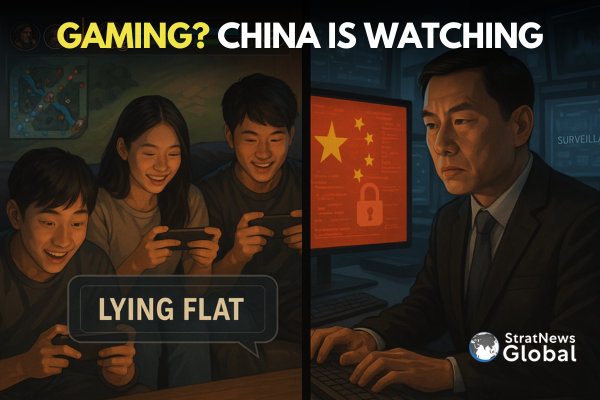Last week, in what may be the most hilariously dystopian use of a gaming chatbox since someone rage-quit a digital chess match, a Chinese player of Three Kingdoms Kill casually entered the phrase “lying flat.” The response? Instant censorship. No warning, no error—just a digital erasure, as if the term had never existed.
For those unfamiliar, “lying flat” (躺平) is not a new yoga pose, but a quiet rebellion against China’s soul-sucking 996 work culture. Young people in China started using it as code for “I’m done with this rat race.” Apparently, Beijing is not amused.
That a slangy expression of burnout was detected, flagged, and obliterated in real-time inside an online strategy game says a lot about the state of things. Video games, once a refuge for social misfits, teens, and the sleep-deprived, are now yet another trench in China’s never-ending war on bad vibes.
“China is using soft power through gaming to advance its national interests,” explains Siddhant Hira, a Researcher at NatStrat who specializes in China’s digital strategies. “Beijing’s ‘thousand grains of sand’ approach means collecting small bits of data to build a bigger picture. By mining user data and monitoring chat features in games, even casual conversations can become potential sources of intelligence.”
Translation: That time you joked about Winnie the Pooh in a League of Legends lobby? It’s now part of someone’s spreadsheet in Beijing.
It’s not just Three Kingdoms Kill. Say the words “Tiananmen,” “Taiwan,” or the unthinkable “Tibet” in a game chat and you’ll likely be auto-muted faster than a ragequitting teammate. A Citizen Lab study found over 180,000 banned keywords embedded in Chinese mobile games. That’s more censorship triggers than Pokémon species. Gotta mute ‘em all.
Even more fun? China’s gaming megacorp Tencent has its fingers deep in the West’s gaming pie. With investments in Riot Games, Epic Games, Activision Blizzard, and more, the company is now a kind of digital middleman between Beijing’s Ministry of Truth and your kid’s Fortnite obsession.
According to the Center for a New American Security (CNAS), Tencent’s access includes chats, user behaviour, and device-level data—meaning if your mouse hand gets sweaty during Overwatch, someone might be tracking that too. Meanwhile, global games like Genshin Impact diligently censor terms like “Hong Kong” and “democracy” from their chat windows. Because nothing says fantasy RPG like state-mandated silence.
Wired also reported that Tencent rolled out facial recognition tech in games to verify if minors are really sleeping during “curfew hours.” That’s right: bedtime is now enforced by a virtual bouncer with AI.
“Even casual gameplay can feed into China’s data ecosystem,” says Hira. “What appears to be innocent banter may offer insight into foreign sentiment, behaviour patterns, even geopolitical leanings.” In other words, that guy trash-talking his team in PUBG might accidentally be doing international diplomacy.
The Australian Strategic Policy Institute (ASPI) lays it out in black-and-white: the Chinese Communist Party sees online platforms—including games—as strategic assets for public opinion warfare and surveillance. In China’s $50 billion gaming market, with over 700 million players, even the chatbox has become a weapon.
So what was once a space to flame your teammates for dying too early is now a heavily monitored zone, a cheerful blend of entertainment, espionage, and Orwellian oversight. Think of it as League of Surveillance.
The most sinister part? You won’t even know you’ve been flagged. There’s no pop-up, no “Your Chat May Be Recorded for Quality and Authoritarian Purposes” warning. Just a quiet click, a deleted phrase, and a new blip in China’s data cloud.
In a world where emojis are scanned, chats are dissected, and a meme can land you on a watchlist, maybe it’s time we stopped asking whether Beijing is spying on our games—and started asking how many levels deep we already are.
Game over? Not quite. Beijing just hit Continue.
Research Associate at StratNewsGlobal, A keen observer of #China and Foreign Affairs. Writer, Weibo Trends, Analyst.
Twitter: @resham_sng





